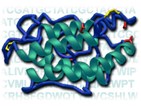Structural Bioinformatics Completes $32.6 Million Financing

Perseus-Soros BioPharmaceutical Fund (Los Angeles and London) was the lead investor. Other players included INVESCO Capital Management (Denver), Deutsche Vermogensbildungsgesellshaft m.b.H. (advised by AP Asset Management of Zurich), Veritas SG Investment Trust GmbH (Frankfurt, Germany), Castle Rock Capital Management (New York), New Medical Technologies (Basel, Switzerland), Dansk Kapitalanlæg A/S (Copenhagen, Denmark), and BioAsia Investments (Palo Alto, CA). ING Barings (New York) served as the exclusive placement agent.
The funding allows SBI to expand its computational science, drug discovery science, and database infrastructure in parallel with growth in its protein structure and structural variant databases and structural data mining technologies. SBI will also use the funds to expand in-house and joint-venture discovery projects with pharmaceutical and biotechnology partners.
"The response to SBI's business focus has been outstanding," said Edward T. Maggio, chairman, president, and CEO of SBI. "As sequencing of the human genome is nearing completion, we are seeing a fundamental evolutionary shift in attention toward genome-derived protein structure and structure-based drug design. SBI is positioned to become the main source of highest quality, large-scale, proprietary 3D-protein structure and structural polymorphism information for the decade ‘after the genome.' The added proprietary information content generated by SBI as it converts gene sequences to 3D protein structures constitutes a very real and viable response for genomics companies concerned not only about preserving, but actually significantly expanding, the value of their proprietary intellectual property assets."

By computing protein structures mathematically, SBI offers clients the possibility for ‘in silico' testing before committing to expensive clinical or preclinical trials.
Why Investors Are Interested
Founded in 1996, SBI and Danish subsidiary SBI Advanced Technologies A/S seeks to unify genomics and combinatorial chemistry to accelerate drug discovery. Working at the interface of computational and physical sciences, SBI's 18,000 square foot facility houses supercomputers as well as traditional basic science capabilities.
SBI-Advanced Technologies (Copenhagen) develops commercial applications of advanced information theories and structure prediction technologies under the direction of a group of distinguished scientists from Copenhagen's DTU (Technical University of Denmark). Some of SBI's core technology was developed and validated at ImmunoPharmaceutics Inc. (San Diego) by a technical group that includes the scientific founders of SBI. This core group of scientists eventually used their technology to generate endothelin antagonists, fibroblast growth factor antagonists, TNF antagonists, and other drugs now in various stages of development through Phase IIB clinical trials.
Over the past 18 months SBI has advanced its technology on several fronts, especially through collaborations with large pharmaceutical companies (the principal source of SBI revenues). In the second quarter of 1999, SBI began enlisting subscriptions to its proprietary structural bioinformatics database, SBdBase, which combines genomics-derived structural information with structure-based drug discovery and structure-focused high-throughput screening of fine chemical and combinatorial libraries.
In addition, SBI has developed proprietary computational techniques for generating highly refined 3D structural models of proteins from primary gene sequences. Since these renderings compare so well with crystal structures, SBI is capable of performing in silico drug screening for millions of compounds in its scaffold-specific virtual combinatorial libraries (CombiLib) or using a client's in-house compound collections.
SBI offers two subscription database products. SBdBase, composed of thousands of protein structural models from more than 150 distinct families, enables rational discovery-level design across multiple disciplines within pharmaceutical and life sciences. SVdBase is a growing series of structural variant database modules each containing structural models generated from genetic polymorphisms in a single, medically important gene, such as HIV reverse transcriptase or HIV protease. SBI's partner in developing the HIV SVdBase modules is Quest Diagnostics Inc. (San Diego), a leading provider of diagnostic testing, information, and services.
For more information: Edward T. Maggio, Chairman, Structural Bioinformatics Inc., 10929 Technology Place, San Diego, CA 92127. Tel: 858-675-2400. Fax: 858-451-3828.
By Angelo DePalma
